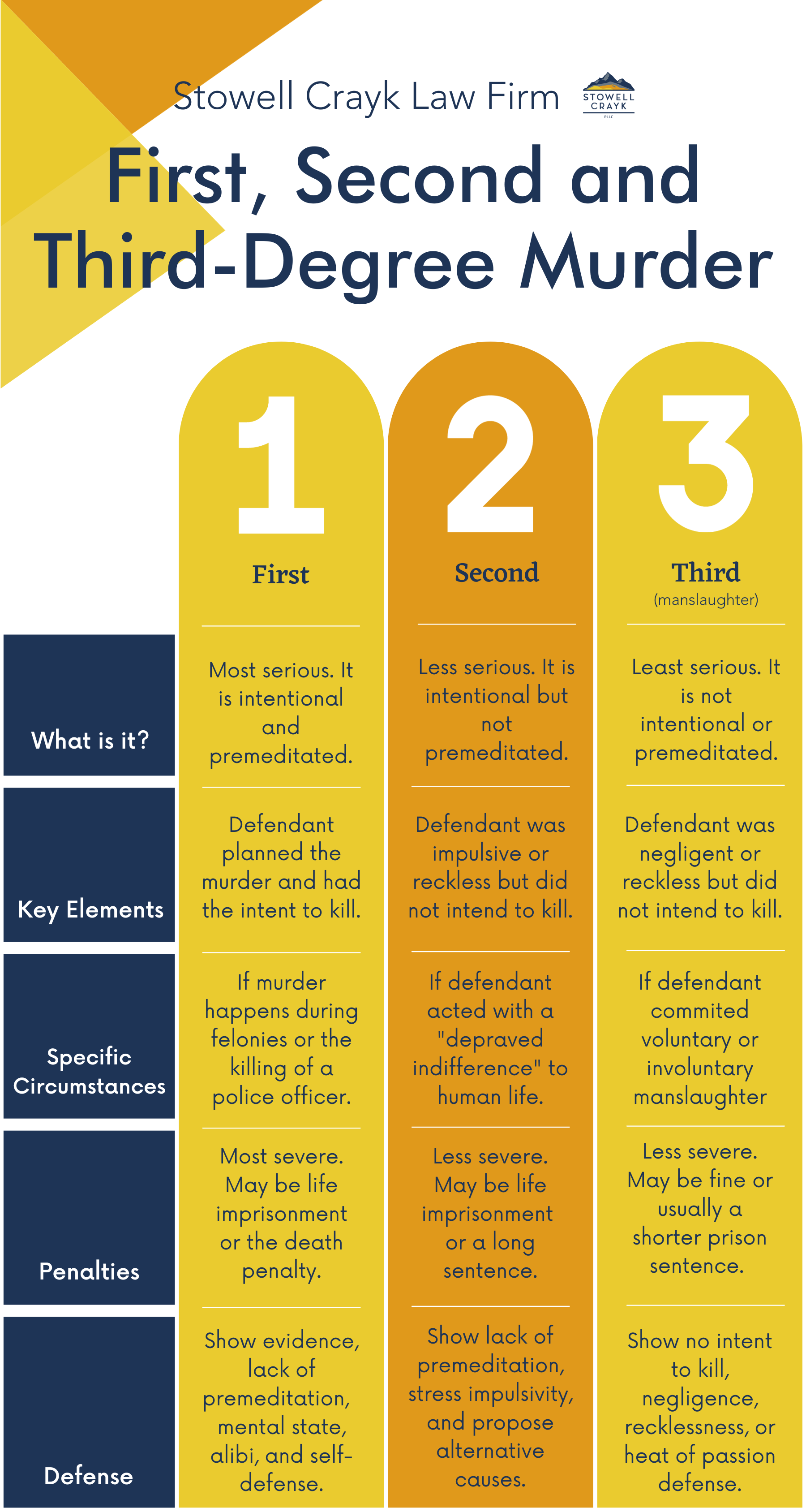First, second, and third-degree murder are legal classifications used in many jurisdictions, primarily in the United States, to distinguish between different levels of culpability in a homicide case. The specific definitions and penalties can vary by jurisdiction. Therefore, it is important to consult a qualified criminal defense lawyer to understand the details of your case.
A murder charge carries severe consequences, including potential long prison sentences and legal penalties. It can result in job loss, voting restrictions, and emotional despair. If you have been charged, seek experienced legal representation immediately. The team at Stowell Crayk Law Firm has over 100 years of combined legal experience. Without a doubt, we will help you navigate the complex legal process and protect your rights.
1. First-Degree Murder
First-degree murder is the most serious and intentional form of homicide. It is a crime that shocks the conscience and carries the harshest penalties.
Premeditation and Deliberation
One of the defining characteristics of first-degree murder is the presence of premeditation and deliberation. This means that the defendant planned the murder and had the intent to kill before committing the act. In essence, there was a period of contemplation and a conscious decision to carry out the act. This level of intent sets it apart from other forms of homicide.
Specific Circumstances
First-degree murder charges may also be levied when the crime occurs under certain specific circumstances. For instance, if a murder takes place during the commission of certain felonies such as robbery, rape, or arson, it may be classified as first-degree murder. Additionally, the intentional killing of a law enforcement officer often falls under this category, leading to even more severe penalties.
Penalties
Penalties for first-degree murder are the most severe and often include life imprisonment or the death penalty, depending on the jurisdiction. The gravity of this crime underscores the importance of seeking legal representation promptly. If you or someone you know is facing first-degree murder charges, hiring a qualified criminal defense lawyer is not just advisable; it’s crucial.
Your Criminal Defense Lawyer
Defending a first-degree murder charge is a complex legal challenge. A criminal defense attorney must carefully review the prosecution’s evidence and build a strong defense to counter the prosecution’s claims of premeditation and intent. This may involve investigating the defendant’s mental state, alibi, or problems with eyewitness testimony. The lawyer may also look for mitigating factors, such as mental illness or self-defense, that could reduce the charges.
The goal is to raise doubts about the prosecution’s case and, if possible, get a lesser charge or acquittal. A skilled lawyer can also advocate for a fair trial and make sure the defendant’s rights are protected.
2. Second-Degree Murder
Second-degree murder, while still an intentional killing, lacks the premeditation and deliberation required for first-degree murder. It involves impulsive or reckless acts that result in someone’s death, but without the specific intent to kill. A criminal defense lawyer can reduce this charge.
Lack of Premeditation
Unlike first-degree murder, second-degree murder does not involve the intricate planning and premeditation. It may result from a sudden outburst, heated argument, or reckless behavior that leads to a tragic consequence.
Depraved Indifference
In some cases, second-degree murder charges can be applied when the defendant acted with “depraved indifference” to human life. This means they showed a callous disregard for the well-being of others, even if they didn’t specifically intend to kill. The disregard for the potential consequences of their actions is a critical factor in determining second-degree murder.
Penalties
Penalties for second-degree murder are also severe and can result in a lengthy prison sentence, but they are generally less severe than those for first-degree murder. It’s important to remember that the exact penalties vary by jurisdiction and the specific circumstances of the case.
Murder Lawyer’s Defense
Second-degree murder is not premeditated like first-degree murder, but a criminal defense lawyer is still very important. When defending against a second-degree murder charge, the lawyer will usually try to show that the defendant did not mean to kill the victim. They will argue that the defendant’s actions were reckless or impulsive, not planned. They may also introduce evidence to show that the death was caused by something other than intent, such as self-defense or the defendant not caring about human life.
A strong legal defense in these cases can lead to a lesser charge, such as manslaughter, or an acquittal if the evidence supports it.
3. Third-Degree Murder (Manslaughter)
Third-degree murder, often referred to as manslaughter, represents a distinct category of homicide. It involves a killing that lacks the intent and premeditation associated with first and second-degree murder. Manslaughter cases encompass various scenarios and degrees of culpability. A criminal defense lawyer can reduce first and second-degree charges to this one.
Reckless or Negligent Behavior
Third-degree murder can include situations where the defendant’s reckless or negligent behavior results in someone’s death. This might involve actions like reckless driving, medical malpractice, or other negligent acts that lead to a fatality.
Heat of Passion or Fight
Manslaughter is typically divided into two categories: voluntary manslaughter and involuntary manslaughter. Voluntary manslaughter involves intentional killing in the heat of passion, often resulting from a highly emotional situation. Involuntary manslaughter, on the other hand, occurs due to negligence or reckless actions without a specific intent to kill.
Penalties
Penalties for manslaughter are generally less severe than for murder, with varying prison sentences depending on the specific circumstances and jurisdiction. While the consequences might be less severe than first or second-degree murder, it is still a serious offense, and legal representation is critical in such cases.
Murder Lawyer’s Defense
Defending against third-degree murder or manslaughter charges often requires different strategies. In these cases, the goal is to prove that the defendant did not intend to kill the victim and that the death was caused by negligence, recklessness, or acting in the heat of passion. A criminal defense lawyer may investigate and present evidence to show that the defendant did not intend to kill the victim or that they were acting under extreme emotional distress. The lawyer may also try to highlight any factors that could reduce the defendant’s culpability, such as not knowing or understanding the potential harm.
A successful defense in these cases can lead to reduced charges or a lighter sentence, depending on the circumstances.
How a Murder Lawyer Helps
In all of these cases, a lawyer with experience defending murder cases is not optional – it is essential. If you want to protect your rights, challenge the prosecution’s case, and get the best possible outcome, a lawyer does it all for you. Their job is to understand the law, use the facts of the case to their advantage, and build a strong defense for the defendant.
Also, it’s important to note that these definitions can vary significantly between different states and countries. Therefore, if you are dealing with a specific legal case or need accurate information, consult a professional.
Contact Stowell Crayk
If you or someone you know is facing murder charges, it is important to get a criminal defense lawyer right away. The law can be complicated, and a lawyer can help you navigate the system and protect your rights. The lawyers at Stowell Crayk Law Firm have experience handling all types of murder cases, including first, second, and third-degree murder. They can help you build a strong defense and give you the best chance of a positive outcome. Contact Stowell Crayk today for a consultation. Your future may depend on it. Remember, when it comes to your legal rights and your future, seeking professional guidance is the first thing you should do.

